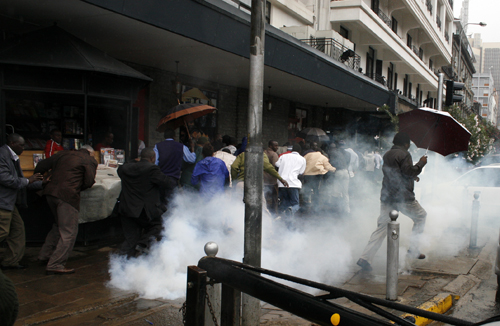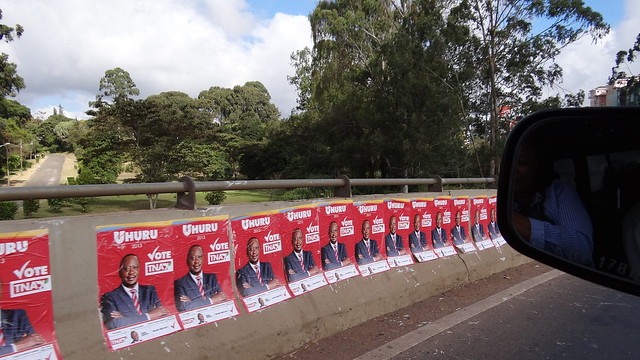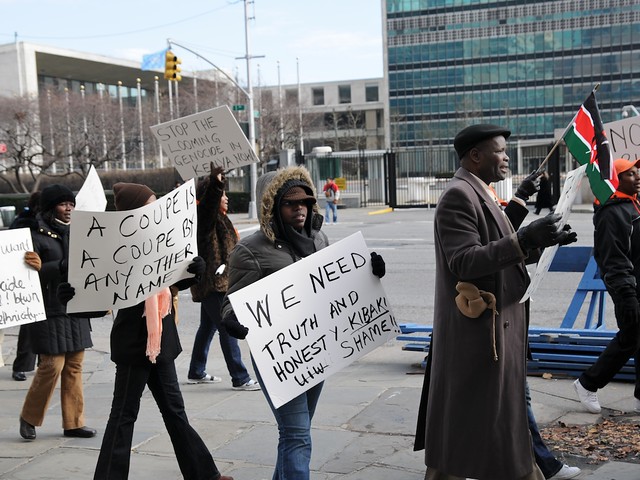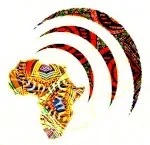From Voting to Violence in Kenya
Kenya Violence
Violence has tarnished elections in Kenya with 2007 Post-Election Violence being the bloodiest on record to date.

Kenya's presidential elections have been marked with some type of violence and protests, and the 2007 vote was best known for murder and mayhem along ethnic lines.
Explore and Understand Africa Through Her Food and Culture
Violence has tarnished elections in Kenya with 2007 Post-Election Violence being the bloodiest on record.
The Issue
Kenya’s President Daniel Toroitich arap Moi stepped down in December 2002 after serving 24 years from 1978-2002 following fair and peaceful elections. Mwai Kibaki, running as the candidate of the multiethnic, united opposition group, the National Rainbow Coalition (NARC), defeated Kenya African National Union (KANU) candidate Uhuru Kenyatta, the son of founding president Jomo Kenyatta, and assumed the presidency.
However, Kibaki's reelection in December 2007 brought charges of voter fraud from Orange Democratic Movement (ODM) candidate Raila Odinga and let loose two months of violence where over 1,000 people died and left over 300,000 people displaced.

The Mediation
Former UN Secretary-General Kofi Annan spearheaded the peace mediation directed by the African Union 0n January 22, 2008. The 41-day mediation peace talks began three weeks after the Post-Election violence erupted across Kenya, also included former President Benjamin Mkapa of Tanzania, and former South African First Lady Graça Machel and Nigerian Foreign Minister Oluyemi Adeniji.
On February 28, 2008, after six weeks of intense negotiations between the opposition Orange Democratic Movement (ODM) and the Government of Kenya’s Party of National Unity (GoK/PNU), Kofi Annan, said farewell to Kenya a few days later on March 3rd. But this was only the beginning of an even longer and more difficult road ahead toward sustainable peace in Kenya.
The technical elements were left in the hands of Attorney-General Amos Wako and a team of lawyers whose job it was to draft the necessary bills for the implementation of the power-sharing agreement into law.
The peace mediation continued over the root causes of the crisis left in the hands of Nigerian Foreign Minister Oluyemi Adeniji, who was tasked with addressing the land issue, historical injustices, the cycles of dispossession, and the steps needed to move toward reconciliation.

The Solution
The Agreement on the Principles of Partnership of the Coalition Government, was signed by President Mwai Kibaki and the Honorable Raila Odinga on February 28th, putting an end to the crisis.
The Agreement on the Principles of Partnership of the Coalition Government agreement is built on the principles of power sharing. Parties agreed to enact the 2008 National Accord and Reconciliation Act, specifying principles concerning the authority of the prime minister, coalition members, cabinet, and parliament.
The chief mediator Kofi Annan, stated "a crisis presents us with both danger and opportunity. On the one hand, the danger was that this East African nation, previously perceived as an island of political and economic stability and an essential hub for international activity, would allow the election crisis of 2007 to deteriorate into a catastrophic civil war along ethnic lines.
As messages of hate penetrated the radio waves and a church full of fleeing women and children went up in flames, the echoes of Rwanda and Côte d'Ivoire made this danger a very real one.
The opportunity, on the other hand, was that the crisis could be used to actually address deeply rooted problems: the simmering grievances, repeated ethnic migrations, and the cycles of dispossession which have characterized Kenya’s colonial and postcolonial years.
This was indeed an opportunity to create a political system which could attempt to address the vast disparities in wealth and the endemic sense of marginalization."
Together we build awareness that boost harmony, education, and success, below are more links to articles you will find thought provoking.
- Historical African Country Name
- Top 20 Largest Countries in Africa
- How many countries does Africa have?
- Roots of Africanized Christianity Spiritual Songs
- Paying Money To Tour Slums in Africa
- Awesome Kenyan Woman
- Land is Not For Women in Sierra Leone
- African Kente Cloth Facts
- Accra the Ghanaian Capital Ultimate Mall Experience

 Since 2007
Since 2007




